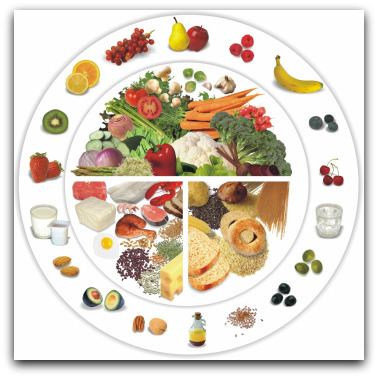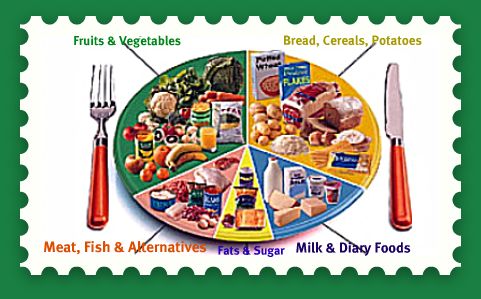A Balanced Healthy Diet and its Benefits
A balanced healthy diet is made out of choices and habits that maximizes the process of foods.
15 Important Tips for a
Balanced Healthy Diet
1. EAT SEVERAL SMALL MEALS. Studies show that eating four to five small meals will optimize digestion, improve metabolism, and reduce the conversion of calories to fat. Grazing is better than gorging.
2. AVOID SKIPPING MEALS. Going even four or five hours without food can trigger the starvation response and cause your metabolism to slow down.
3. REDUCE THE EVENING MEAL. When you eat, your metabolism increases to digest the food. Much of this increased energy is given off as heat. This thermogenic effect significantly reduces the amount of calories absorbed from a meal. It is much higher in the morning than it is at night.
4. EAT BEFORE EXERCISE. When you exercise on an empty stomach, the body, perceiving not only hunger but also activity, may further lower the metabolic rate. Eat a small meal or snack forty minutes to an hour before exercising.
5. REDUCE CALORIES GRADUALLY. If you go on a low-calorie diet, your body eliminates all or part of the thermogenic effect in an effort to conserve energy. In addition, enzymes are produced that signal the body to store all available calories as fat. These two survival mechanisms will not only sabotage weight loss but contribute to increased weight gain as soon as a normal balanced healthy diet is resumed.
6. EAT HIGH-FIBER FOODS. Consuming high-fiber foods such as whole grains, beans, vegetables, and fruits result
in decreased fat storage. They are part of a balanced-healthy diet. Not only are these foods naturally low in fat, but a portion of the fat consumed during a high-fiber meal is combined with the fiber and eliminated as waste.
7. AVOID HIGH-FAT FOODS. All calories are not created equal. Excess calories from fat will make you fat a great deal faster than will excess calories from protein or carbohydrates. The conversion of carbohydrates and protein to fat requires a great deal of energy. Fat calories, however, are easily converted to stored fat in your body.
8. DECREASE THE USE OF SUGARS. This means not only table sugar but also glucose, dextrose, brown sugar, corn syrup. Sugar is a major enemy of weight control, adding worthless calories and sending a message to every cell in the body to store calories.
9. WHEN IN DOUBT, EAT VEGETABLES. Vegetables are the dieter's best friend in a balanced healthy diet, and I don't mean just carrot and celery sticks. Expand your vegetable intake to include a wide variety of delicious, high-energy foods from the produce section of the grocery store. Most markets offer some forty types of vegetables that can be steamed, broiled, barbecued, or eaten raw in a salad. Vegetables are low in calories and high in vitamins, minerals and complex carbohydrates. Because they are an excellent source of fiber, vegetables also contribute to a sense of fullness and satisfaction.
10. SEND ACTIVITY MESSAGES. Studies show that your brain gets metabolic "signals" depending on your activity level during the day. Don't let your body forget that it is active and needs a high level of energy. Remember that calories do not evaporate. They must be stored as energy (glycogen) or as fat. For successful long-term weight management your must convince your body that you are active and need energy. Take frequent activity breaks every couple of hours. Ten minutes of brisk walking, a few flights of stairs, or a quick set of stretching exercises will do the trick. A longer activity break of fifteen to twenty minutes after meals is highly recommended. A moderate-paces thirty to forty minute walk will help to convert calories to energy rather than fat. This also contributes to a balanced healthy diet.
11. EAT SLOWLY. Appetite is regulated by the secretion of an hormone called cholecystokinin (CCK) which is produced by the small intestine. This hormone is released toward the end of a meal and sends a signal to the brain to shut off the appetite. Eating fast tends to bypass this important message, leasing to the overconsumption of food. Adding protein to the beginning of a meal will help stimulate CCK and provide a natural feeling of satisfaction with surprisingly few calories.
12. AVOID STIMULANTS.A balanced healthy diet necessitates that you avoid caffeine and herbal stimulants. They produce a stress response that temporarily suppresses your appetite. A few hours later, not only will your appetite be back with a "vengeance" but yur nervous system will be the worse for wear. There are no long-term studies indication any weight-loss benefits from stimulants.
13. TAKE OUT SOME NUTRITION INSURANCE. Research shows that if a diet was perfectly planned, it would still take about 2,000 calories for men and 1,500 calories for women to provide them with a barely adequate level of vitamins and minerals. Since most of us don't have the time or energy to plan our meals perfectly, multivitamins are an effective form of "nutritional insurance". Since most dieters consume fewer calories than those perfect levels, it's easy to see why dieters have been called the nation's largest group of malnourished people.
14. DRINK WATER. Water can be a wonderful help in a weight-loss program and in a balanced healthy diet. The water you drink is essential for the transport and burning of fat as well as the elimination of waste products that result from enhanced metabolic activity. In fact, water is vital to all the body's functions, including movement, digestion and temperature regulation. Most people don't drink enough water and, as you begin to exercise more, you'll find that your need for water increases.
15. FORGET DIET FOODS, AND ESPECIALLY DIET SOFT DRINKS. A healthy balanced diet is not made of diet foods. The belief that food quality doesn't matter as long as a food is low in calories is a dangerous misconception. Look carefully at diet food labels. You'll often find excessive salt, sweeteners, artificial colors and flavors and ingredients you can't pronounce. Dome of these ingredients are health risks, but we buy the products anyway because we are desperate to lose weight. Know that these products do not account for a balanced healthy diet and that they don't work... These balanced healthy diet tips are certainly highly informative. To learn even more on the subject, I invite you to follow this link to read the page on: - Dhea Supplement -
From this "Balanced Healthy Diet" page, back to "Home Page"
Home Page |
Contact Page | Solo Build It! |
Site Map |
About Us |


